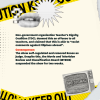¹Creativity, Conservatism, and Censorship: A Philippine Snapshot. Sept 1 2022. https://artsequator.com/creativity-conservatism-censorship-phillipine-snapshot/
²In an 4 August 2017 speech to soldiers, Duterte said in Tagalog: “Whoever’s getting a medal of valor, I’m sure some of you will get one, I will give you my guns … I’m old and don’t favor them anymore. I’ll raffle them off to you. Consolation prizes will be celebrities, I will bring them. <laughter> And maybe for those who get a medal of valor, the hard ones, I will give you a prize. Maybe a trip to Hong Kong … for free … if you want you can bring your partner or wife … if you don’t want, tell me which celebrity you like and we will ask them to go <…>” <translation mine>
“So kung sino ‘yung — mga valor-valor diyan, sigurado, meron kayong ano. Ibigay ko na ‘yung mga baril ko, matanda na ako at tsaka nawala na ‘yung hilig ko. Wala na kasi akong hilig dun. Pang — pangbigay ko ‘yan sa mga ano... Sigurado ‘yang may mga valor dito. I’ll give one. Kung marami kayo, bunot-bunot na lang. Ang consolation prizes, ‘yung mga artista dadalhin ko. <laughter> <…> At tsaka siguro may prize ako ‘yung ano — ‘yung valor ‘yung mga tigas. Mga Hong Kong siguro. <applause> Hong Kong — libre ‘yan. Kung gusto mo magdala ng partner, asawa ... Kung ayaw mo naman, sabihin mong ituro mo ‘yung artista na gusto mo at pakiusapan natin. <laughter> Ah bilib ‘yan. Ay, totoo. Ah, alam mo ‘yang mga babae, pagka ganun, “T*** i**, valor ‘to, tigas ‘to.” Mas tigas ito sa u***, p***** i**. <laughter> Matigas ito sa away eh.
³In June 2018, on a trip to South Korea, Duterte was shown on live television gesturing to two women in the audience that they needed to give him a kiss in exchange for the books he was holding “There’s payment for this, a kiss. You in white, are you ready to engage in kissing? Come here.” He then proceeded to demand a kiss from the woman. https://www.theguardian.com/world/2018/jun/04/philippine-president-criticised-for-kissing-woman-on-stage
⁴There are many instances of this, but in a 26 May 2017 speech, Duterte told soldiers he would take responsibility if they rape women during a time of martial law. “Don’t worry. I will be with you. If you go down, I go down. For this martial law and the consequences and ramifications of martial law, I and I alone would be responsible, just go to work. <applause> I will be in charge <…> I will let myself be jailed for you. If you rape three women, I will admit those as mine.” <translation mine>
“Huwag kayo mag alaala. Sasamahan ko kayo. I will... If you go down, I go down. But for this martial law and the consequences of martial law and the ramifications of martial law, I and I alone would be responsible, trabaho lang kayo. [applause] Ako ng bahala. <…> Ako na ang magpakulong sa inyo. Pag nakarape ka ng tatlo, aminin ko na akin ‘yun.”
⁵In a 7 February 2018 speech, Duterte said in Bisaya: “They will say "Okay, how many people are dead?" "Three." "What?" "Three." "Son of a bitch, don't lose." "Are there any women holding guns?" "Sir, she's a fighter. An amazona." "Shoot the vagina" <laughter> <…> Tell the soldiers. "There's a new order coming from mayor. We won't kill you. We will just shoot your vagina so that..." If there are no — it would be useless.” <translation from transcript in official government website pcoo.gov.ph>
Muingon na sila nga nga "Oh, sige. Oh. Unya pila'y patay?" "Tulo. Tulo." "Ha?" "Tulo na." "P***** i**. Ayaw pud paalkanse." “Naay babae? Unsa man, nakagunit og armas?" "Sir, fighter gyud. Amazona.” "Pusila sa b**** arong di na..." <laughter> <…> Dal-a na. Ingna ang mga sundalo. Ingna sila ang mga sundalo. "Ah, unsa man nang babae." Ingna sila. Tawga run ang mga sundalo. "Order bag-o ni mayor. Di lang daw mo patyon. Pusilon lang mo sa b**** arong ---" Og wa na ma'y b****, wa na ma'y silbi.
⁶Mocha Uson is generally acknowledged as the primary celebrity who put Duterte into power through her Facebook page Mocha Uson Blog, using the voice of an opinionated citizen who is anti-elite, pro-masses, and standing on the side of the change Duterte promises. This would set the tone for the propagandists after her that grew in number during Duterte’s six years, including but not limited to Sass Sassot and RJ Nieto.


















































